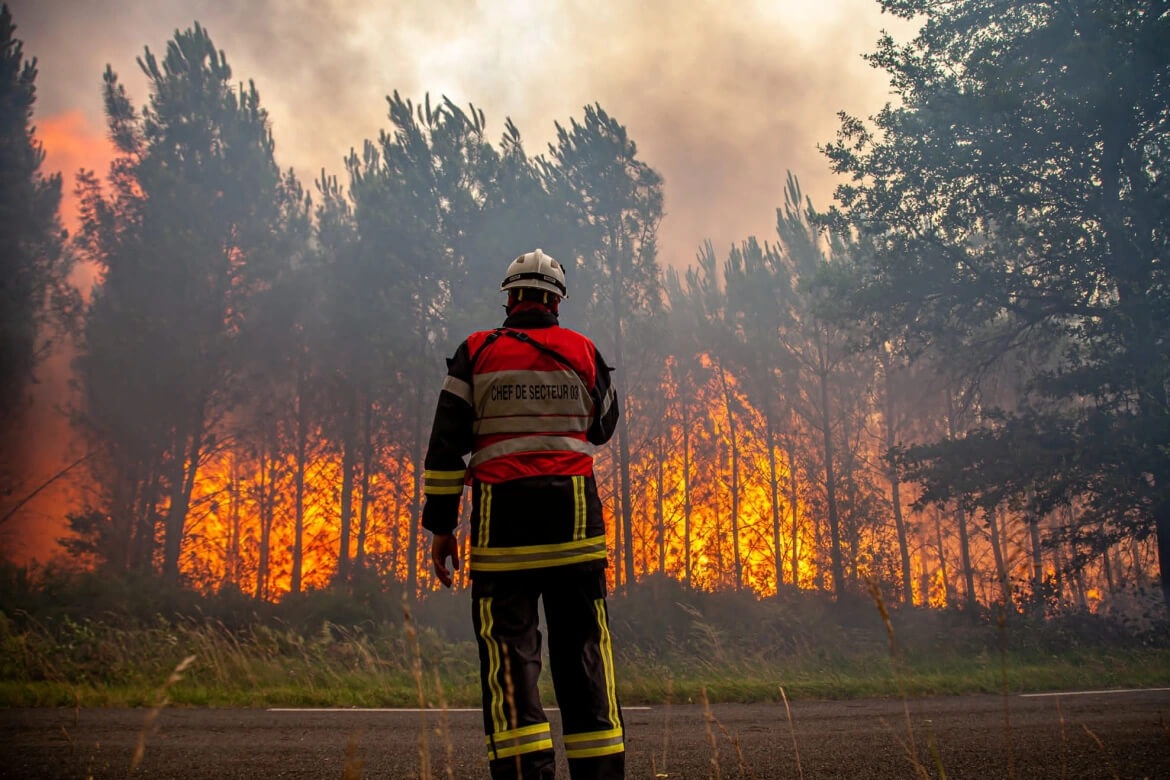Firefighters across Western and Southern Europe and the Mediterranean are struggling to contain widespread wildfires that have already resulted in hundreds of deaths and thousands of evacuations in Portugal, Spain, France, Greece, Albania, Croatia, and Morocco.
The region’s second heatwave this summer has caused temperatures to soar past 40°C. Portugal and Spain, for instance, have seen temperatures touch 47°C and 45°C, respectively.
Keeping this in mind, the European Union (EU) Civil Protection Mechanism deployed support to affected countries, including two firefighting planes each to Portugal, France, and Albania. The EU’s emergency satellite is also helping with damage assessment maps.
#EFFIS Fire Danger Forecast for 17 July
— Copernicus EMS (@CopernicusEMS) July 17, 2022
🔥Very Extreme Danger forecasted in:
➡️🇪🇸Large parts of #Andalucia, #Extremadura, #CastillaLaMancha, #CastillaYLeon, the north of the #Murcia Region, the west of the Valencian Community
➡️Eastern #Portugal🇵🇹
➡🇬🇷Islands & south of Athens pic.twitter.com/pZWjtSXngd
Commissioner for Crisis Management Janez Lenarčič said EU members have shown “strong solidarity” in the face of the “difficult situation” caused by “extreme temperatures” and “devastating fires.”
In Portugal, a week of wildfires ravaged over 15,000 hectares of forest land, bringing the total to over 98,000 acres this year, triple the amount during the same period last year. While two people reportedly died from the fires, 659 people died from last week’s heatwave.
Horrific scenes in south-west France 🇫🇷 as wild fires continue to blaze. Flames reported over 30m high. This is the fire at Teste-de-Buch (Gironde), which is less than 60km from Bordeaux. https://t.co/Z1kBuxaGZ1
— Scott Duncan (@ScottDuncanWX) July 17, 2022
Meanwhile, in Spain, 600 military emergency unit members have been deployed to control fires spanning across 14,000 hectares in the southwestern parts of the country. There were 360 heatwave-related deaths across the country from Sunday to Friday, 123 of whom died on Friday alone.
Spanish firefighters are still struggling to contain over 30 fires, largely in hilly regions that are difficult to access.
#Morocco : Apocalyptic scene in northwest - wildfires create burning wall on edge of town in province of #Larache #العرايش #المغرب #Maroc pic.twitter.com/4TvS9bjDmA
— sebastian usher (@sebusher) July 16, 2022
In France, two forest fires last week damaged 10,000 hectares. More than 14,000 residents and tourists have been forced to flee the affected regions and move to emergency shelters. It has also deployed more than 1,200 firefighters, with 22 firefighting departments on high orange alert as high wind speeds and rising temperatures continue to present “very unfavourable” conditions.
Similar fires were reported in Greece and Morocco, causing one death and thousands of forced evacuations. In Greece, on Saturday, 71 fires broke out in a span of 24 hours.
Meanwhile, Croatia and Hungary also reported wildfires earlier last week.
In the United Kingdom (UK), too, the Met Office warned of temperatures soaring to 40°C on Monday and Tuesday. Authorities have issued a warning urging residents to avoid using public transport such as buses and trains.
In summer 2022, heatwaves around the world felled records and fueled wildfires as temperatures climbed above 40 degrees Celsius (104 degrees Fahrenheit). https://t.co/nC67K3sekq pic.twitter.com/WlyLFi9VHm
— NASA Earth (@NASAEarth) July 15, 2022
According to the European Commission’s European Forest Fire Information System, the region has seen a 300% rise in wildfires this year compared to the past 16 years. It attributed this change to the rise in global temperatures caused by human-induced climate change.
Concerningly, the fires have also caused a surge in energy prices across Europe due to the increase in demand for cooling systems. Low wind speeds and operational issues in nuclear power plants in France have also contributed to an increase in energy prices.

